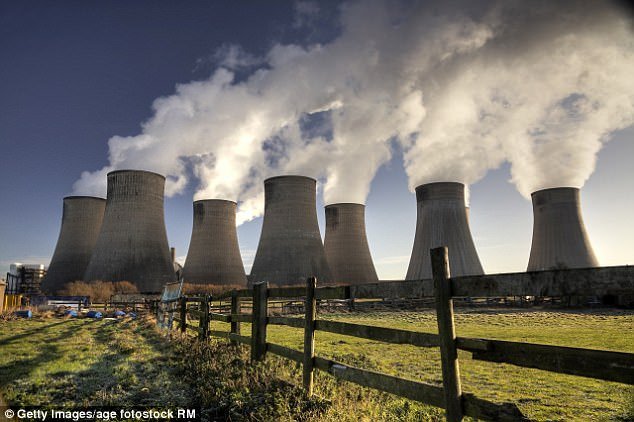Policy problems and dangerous assumptions
- Details
- Written by: J C Burke
- Category: Net Zero Critique
- Hits: 3548
 The Net Zero Acolytes have got it all wrong! And its not Just Us - NetZeroWatch
The Net Zero Acolytes have got it all wrong! And its not Just Us - NetZeroWatch
My Christmas/New Year Message {a Present} to You - the general population and our 'deaf' Government See Letter to Dept of Energy & Net Zero
Government reliance on CENTRALISED power {electricity} generation is part of the root of their poor assumptions. It's the default position of 'Government' to think of CENTRALISATION - and that's just one problem that we will discuss in detail below. But Centralised Electricity Generation {gas/coal/bio-mass etc} is surprisingly inefficient - at converting fuel into electricity. Coal was the least efficient at 22%, with various Gas engines getting into the 30-35% fuel conversion efficiencies.
BUT the reason is the HEAT produced - is "squandered" up those Cooling Towers - if you read our previous articles you will see the futility of the Centralised Electricity Strategy - when there are clear, inexpensive and energy efficient alternatives {see later}.
The other assumptions {re Net Zero}, we have brought to your attention before in these articles on this platform Net Zero - They Haven't Got a CLUE and Again Net Zero - Cold Feet and the biggest question about "Fossil Fuels" a known misnomer
But, let us return to our interrogation with AI - Chat GPT in this case back in March 2023. Here we had to cajole AI into at least considering the alternatives {for once} and not being influenced by continued agenda politics {as we are again being subjected to in late 2024 and as it appears well into 2025. It has to STOP - as the Nation is being herded in the wrong direction - by politics and NOT Science. Read our Discussions with Chat GPT about Electricity Generation HERE
Once you read that - it's patently obvious that in order to radically improve Fuel Efficiency, we need to move to localised DECENTRALISED ENERGY {plus attendant Heat Networks}. For good strategic reasons -
- energy resilience,
- grid embedded energy and
- far greater energy efficiency.
Factor in, Bio-Methane production from Organic Waste Streams to power such decentralised systems then we have ENERGY AUTONOMY at the local level.
- Details
- Written by: J C Burke
- Category: Net Zero Critique
- Hits: 15245
 Our article entitled "Net Zero they do not have a Clue" has garnered a big responce, we penned it on 22nd June 2023 with a big section devoted to the Parliamentary debate covered by Hansard.
Our article entitled "Net Zero they do not have a Clue" has garnered a big responce, we penned it on 22nd June 2023 with a big section devoted to the Parliamentary debate covered by Hansard.
The image shown is part of the problem: 8 cooling Towers sending 65-70% of the Heat Energy in a Centralised Electricity Generating plant up into the sky! This cannot continue - Generation INEFFICIENCY is a major issue with the Centralised Power Network, both in the UK and other nations. It is too inefficient - so those EV vehicles getting their {electrical} charge from the 'mains' are just "importing" their waste.
But now Reuters reports, of news from Shell and BP, tends to indicate serious reservations - and thus COLD FEET!! Litterally!
See the Reuters Report in Full below: Web Linkage: https://1.reutersevents.com/LP=36061,
""Net zero and hydrocarbons – a case of and, not or""
""Media reports that Shell is taking an axe to jobs in its low-carbon solutions and hydrocarbon units -- Reuters reporting in October that around 15% of the Anglo-Dutch supermajor’s workforce would be cut -- have reinforced concerns that the industry’s commitment to net zero may be eroding in a high commodity price climate.
According to the reports, 200 jobs will go in 2024, with another 130 will be placed under review by the company.
The news represents a potential challenge for a company whose low-carbon division was intended to spearhead a transition to clean energy.
But it is not alone. BP – the first oil major to set a course to net zero back in 2020 – has also faced criticism from environmental activists over a scaling back of ambitious emission reduction targets. Climate-focused investors reacted negatively to BP’s February 2023 announcement that it would aim for a 20-30% cut to emission by 2030, compared to 35% previously.
- Details
- Written by: J C Burke
- Category: Net Zero Critique
- Hits: 2269
 Our article entitled "Net Zero they do not have a Clue" has garnered a big responce, we penned it on 22nd June 2023 with a big section devoted to the Parliamentary debate covered by Hansard.
Our article entitled "Net Zero they do not have a Clue" has garnered a big responce, we penned it on 22nd June 2023 with a big section devoted to the Parliamentary debate covered by Hansard.
The image shown is part of the problem: 8 cooling Towers sending 65-70% of the Heat Energy in a Centralised Electricity Generating plant up into the sky! This cannot continue - Generation INEFFICIENCY is a major issue with the Centralised Power Network, both in the UK and other nations. It is too inefficient - so those EV vehicles getting their {electrical} charge from the 'mains' are just "importing" their waste.
But now Reuters reports, of news from Shell and BP, tends to indicate serious reservations - and thus COLD FEET!! Litterally!
See the Reuters Report in Full below: Web Linkage: https://1.reutersevents.com/LP=36061,
""Net zero and hydrocarbons – a case of and, not or""
""Media reports that Shell is taking an axe to jobs in its low-carbon solutions and hydrocarbon units -- Reuters reporting in October that around 15% of the Anglo-Dutch supermajor’s workforce would be cut -- have reinforced concerns that the industry’s commitment to net zero may be eroding in a high commodity price climate.
According to the reports, 200 jobs will go in 2024, with another 130 will be placed under review by the company.
The news represents a potential challenge for a company whose low-carbon division was intended to spearhead a transition to clean energy.
But it is not alone. BP – the first oil major to set a course to net zero back in 2020 – has also faced criticism from environmental activists over a scaling back of ambitious emission reduction targets. Climate-focused investors reacted negatively to BP’s February 2023 announcement that it would aim for a 20-30% cut to emission by 2030, compared to 35% previously.
- Details
- Written by: J C Burke
- Category: Net Zero Critique
- Hits: 66926
 Spending watchdog MPs on the Public Accounts Committee are concerned about lack of transparency, [and] about the cost to consumers of the Government’s plan to expand nuclear, solar and wind power.
Spending watchdog MPs on the Public Accounts Committee are concerned about lack of transparency, [and] about the cost to consumers of the Government’s plan to expand nuclear, solar and wind power.
In addition, the focus on "Carbon Capture Measures" are particularly worrying, from both a cost and desirability aspect, as it blindly accepts the premise that CO2 is a "Causation" of; Global Warming {?} or now "Climate Change". No latitude is given any any dissenting viewpoints such as Dr. Patrick Moore Lee Yun-Jeong Dr Richard Lindzen, even David Ballamy - In 2008 Bellamy signed the Manhattan Declaration, calling for the immediate halt to any tax-funded attempts to counteract climate change. He maintained a view that man-made climate change is "poppycock", insisting that climate change is part of a natural cycle!
In addition Energy Efficiency improvements both in buildings and in the Centralised Electricity systems are not given sufficient prominence - a tragedy considering their "low hanging fruit" aspects and inexpensive improvements. Particularly in the UK's Housing Stock {24.2 million} and the problems with building so few new {and highly energy efficient} properties. New Build Completions; 204,530 {to March 2022} AND 210,320 {to March 2023} and 6 months to September 2023 of 93,480 Completions - and much fewer starts due to Covid Lockdown {insanity}} [Housing, Commercial Retail and Industrial].
The Government estimates that up to £400 billion of public and private investment in new generating capacity will be needed by 2037, but the PAC is unconvinced that the private sector has been given enough clarity to confidently invest.
In a critical report published below {on 15th June 2023}, the PAC calls on Government to pull together numerous decarbonisation plans into coherent strategy. This should be pulled together by autumn 2023 at the latest.
The Government’s delivery plan must also set out when and how the costs of decarbonising the power sector will be likely to have an impact on energy bill payers and taxpayers.
Dame Meg Hillier MP, Chair of the Committee, said: “What is the plan? It has now long been understood and accepted that greening our economy is an existential priority, with the Government setting itself the target of securing an entirely low-carbon power supply by 2035.
- “But without a coherent delivery plan to get there, the Government will find it harder to know what decisions it must take, and when, to ensure that it can realistically reach its ambitions.
- “There are just twelve years left for the Government to meet its low carbon energy target, and much still to do if this is to be achieved – and at a cost the taxpayers and bill payers can bear while ensuring the lights stay on.
- “There is an information vacuum in key areas – energy efficiency, investment, the cost of the transition to the public – that must be addressed.
- “We need an overarching plan charting the way, to provide much-needed confidence to the businesses and consumers who are needed to deliver it. When it comes to tackling the climate crisis, we can see around us, we are already living on borrowed time.”
Actual Discussion and oral Evidence: On following pages
